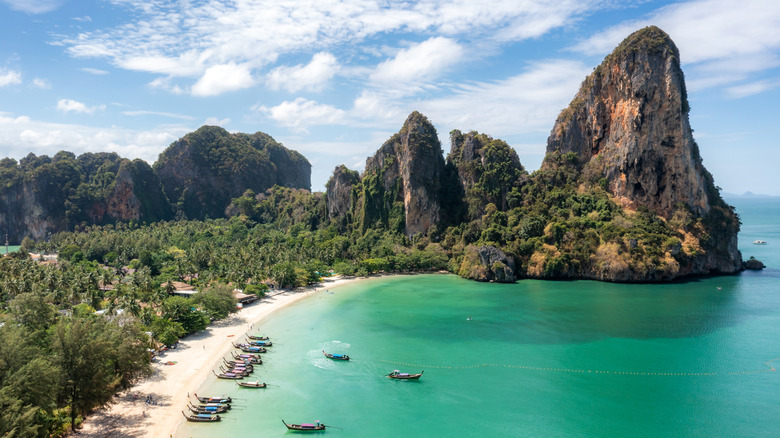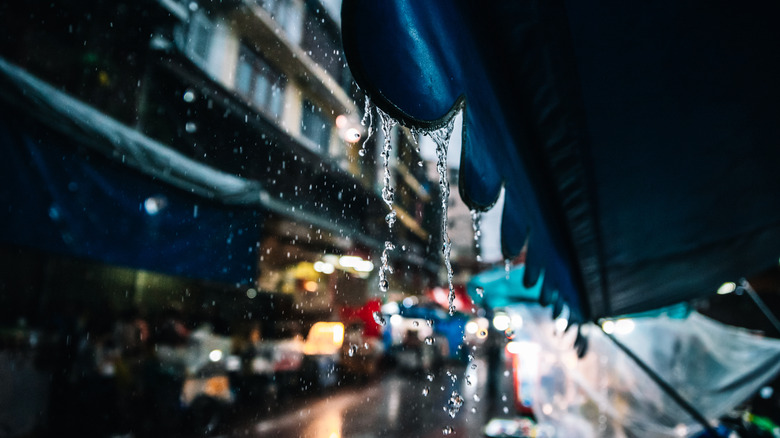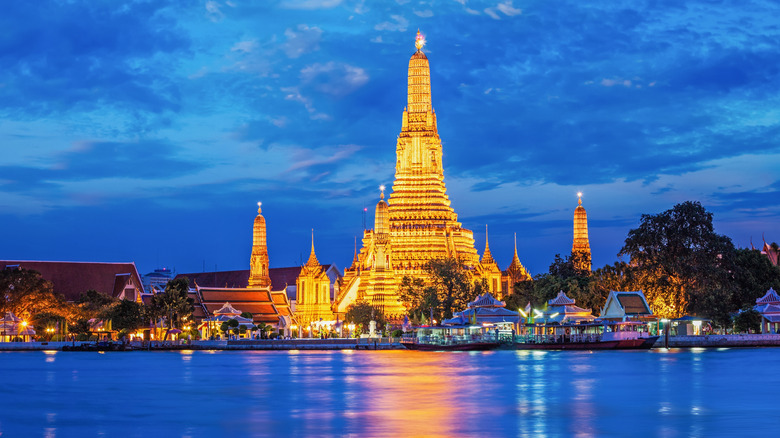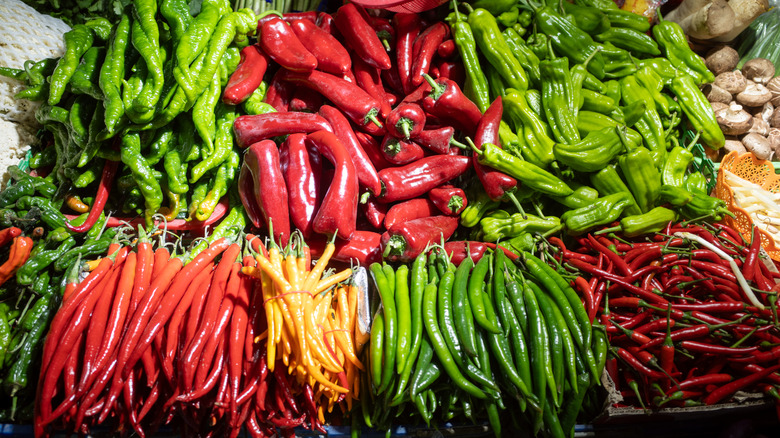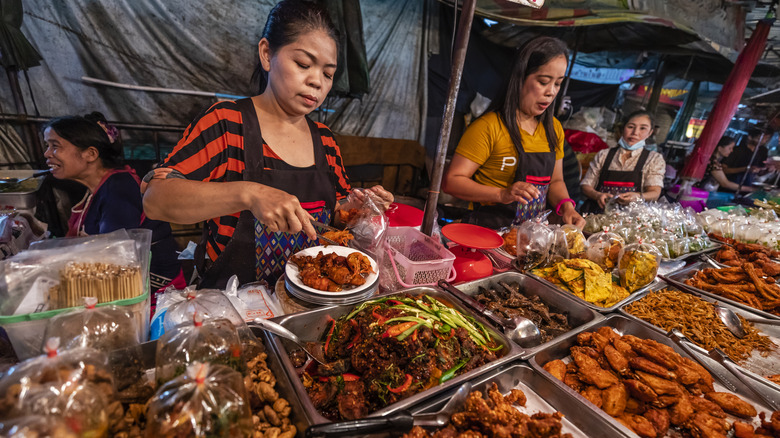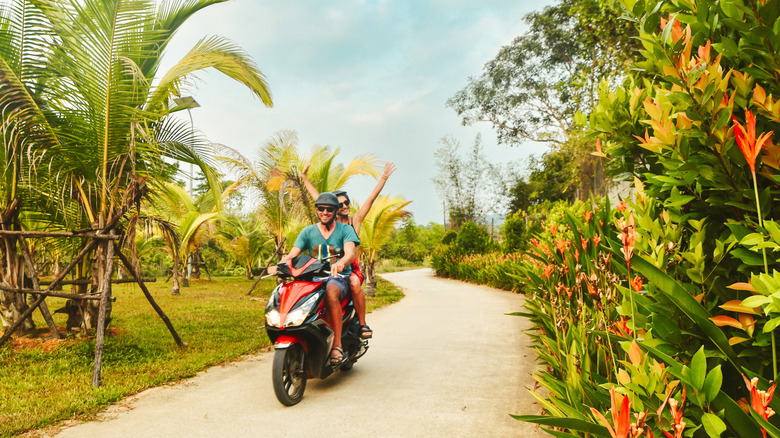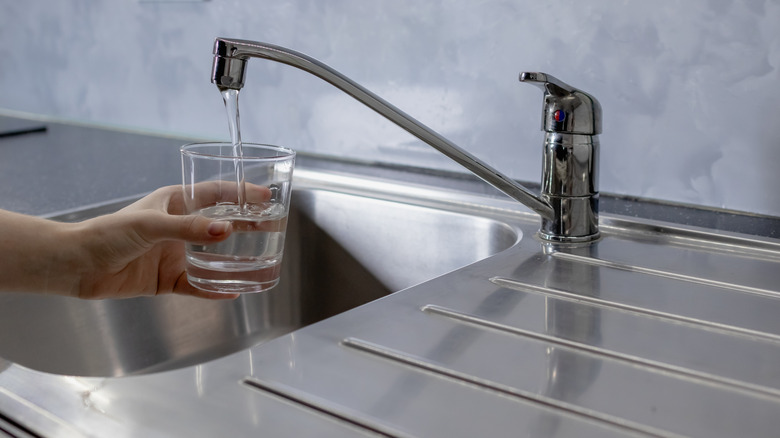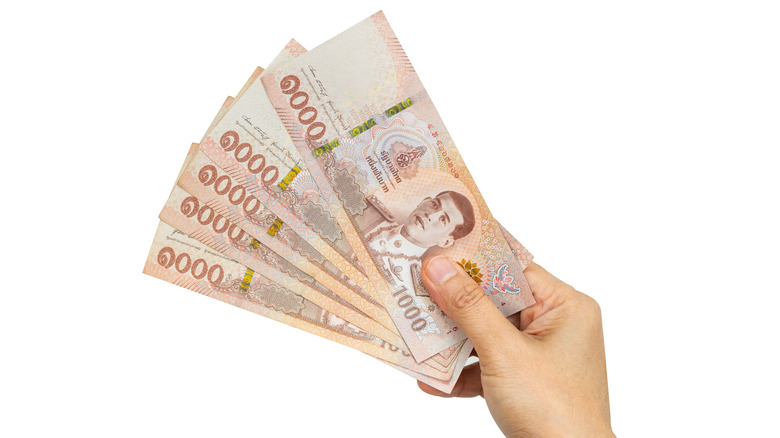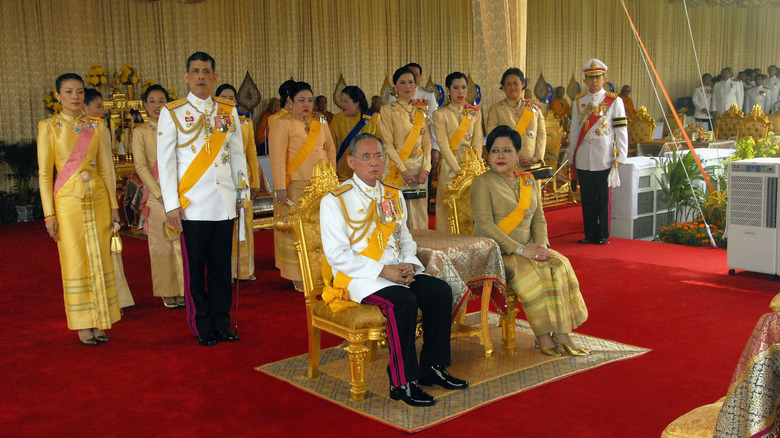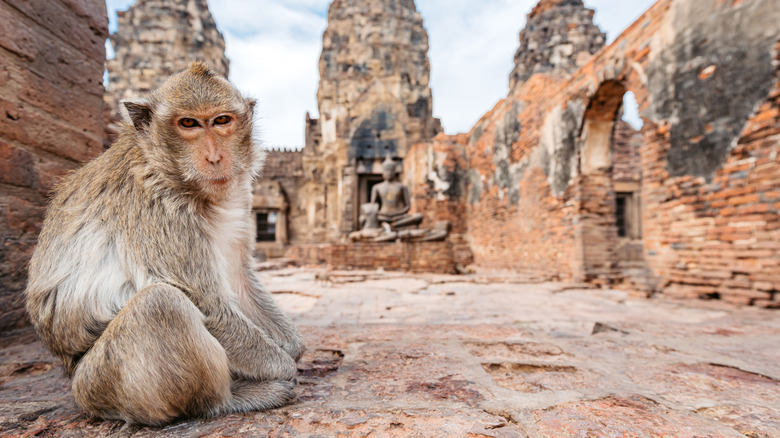Crucial Details Every Traveler Should Know Before A Vacation To Thailand
The stunning beaches and rich history of Thailand await travelers looking for all kinds of vacation experiences. The temples and natural aura of Chiang Mai in the north are perfect for a vacationer seeking to unplug and take some time for introspection. Similarly, the beachside bar scenes in Krabi, Phuket, or Phi Phi (a popular party island) all make for a legendary getaway filled with high-octane fun. There's something for everyone to discover in the Southeast Asian nation, with warm weather dominating the thermostat year-round and great prices on hotels, food, and drinks.
However, heading off to explore the phenomenal beauty and fun of Thailand isn't without caveats and crucial planning. No matter where you're jetting off to explore, it's always a great idea to take some time to learn about the destination. This is important when putting together your packing list. It's also essential for any traveler who wants to maximize their enjoyment and stay out of trouble! Every nation will have its own set of rules, quirks, and critical nuances.
In Thailand, for example, though many cities and towns feature an energetic party atmosphere, the people you'll encounter often exhibit a more reserved and conservative-leaning attitude. Religion, tradition, and respect go a long way in the country, but a visitor who has only looked into hostels and bars to underpin their trip might miss this crucial detail. This, along with a few other factors, can play a vital role in the overall success of your trip.
Pack accordingly; the rainy season varies by location
Thailand finds itself centrally positioned within Southeast Asia's monsoon region. As a result, the country is hammered by rain throughout much of the summer and fall months. On top of this huge volume of rainfall, summer temperatures and a latitude near the equator come together to produce scorching heat on even the coolest days. The rainy season lands during Thailand's low season. When temperatures cool and rains subside, visitors flock to Thailand's sunny beaches and spectacular jungle landscapes. There are numerous reasons to travel in the off-season, and you should definitely reconsider skipping Thailand during this time.
Additionally, packing efficiently is non-negotiable. This is because different parts of the country see intense rainfall at varied times of the year. The rainy season shifts slightly depending on your destination. Northern and Western Thailand experience rains between June and October. However, if you are visiting an area in the Southeast or along the Gulf of Thailand side of the country that extends eastward along the main segment of the Thai mainland toward Cambodia, a secondary monsoon season can be felt. Instead of ending in October, the heavy rains begin here and extend into December or January. Packing with the rainy season in mind and then getting sunny days because you opted to explore East of Bangkok rather than West can put a real damper on your trip.
Remember to stay respectful of Buddhist traditions
The vast majority of people in Thailand are Buddhists (over 90% of the population). In addition to an overarching religious homogeneity, people here naturally exhibit a marked reverence for their faith. Relatively reserved social attitudes are commonplace, even though Thailand is known as a party vacation hotspot, particularly among the youth. Where you'll find the bulk of this conservatism is in Thailand's many temples and other religious sites. Travelers would be remiss to avoid exploring the stunning temple scenery laid across the country, but this aspect of your adventure requires a measure of respect.
When visiting a Buddhist temple or any other religious site in Thailand, remove your shoes before entering. This is a common practice, but those unfamiliar with the tradition might fail to prepare for this requirement. You'll also need to cover your shoulders and upper thighs. Regardless of your gender, wearing a modest outfit is a sign of respect to the holy site, the people who worship within its boundaries, and the religion as a whole. Wearing longer shorts or even opting for pants and a T-shirt that provides full coverage of your upper chest and shoulders is a must on any day you'll be exploring cultural sites.
A modest attire should be a part of your garb throughout city explorations (not just in temples)
Modest attire isn't just an embedded requirement when visiting a Buddhist temple. To show respect to the community, don't wander around town wearing inappropriate, skintight clothing and bathing suits, specifically bikinis. You can, however, strip to pool- or beachside garb while by water. Due to Thailand's climate, relatively light attire should be your clothing of choice when exploring its communities. You can wear breathable, comfortable clothing and still dress respectfully.
Tossing a T-shirt and shorts over your bikini when you leave the water's edge for a bite or drink will prevent funny looks and perhaps even a comment from locals. There's no need to go overboard. You don't need to cover up all of your skin when exploring Thailand. However, just because you're on a beach getaway doesn't mean you can dress down throughout your time away. Pack sensible and comfortable clothing to remain in line with the country's overarching social norms and values.
Be prepared for the heat when grabbing a meal
Spice is commonplace in authentic Thai food. There's no getting around this ingredient, as it's a staple in modern and traditional Thai cuisine. You can certainly find meals that won't blow your taste buds out of the water. However, some of the best options in Thailand's genuinely diverse menu of geographically grounded delicacies feature at least a moderate level of heat.
Whether you're eating in a restaurant or grabbing a bite from a street food vendor, spice is inherent to the equation. If you aren't a big fan of all things spicy, ease yourself into the menu, ideally before you set off for Thailand. For those who can't handle the heat at all, you'll want to plan well to ensure there's always an alternative available that doesn't include intense pepper flavors.
Don't shy away from street food, either
Another key feature of the culinary scene in Thailand is the centrality of street food. Street vendors deliver fantastic dishes all across the country. Pad Thai is an iconic snippet of the nation's cuisine, but getting one in Thailand is an entirely different and often transcendent experience when stacked up against the comparatively sterile foreign recipe.
As a fun aside, in 2002, the Thai government engaged in a massive food diplomacy initiative. Launching the Global Thai program helped significantly to expand the number of Thai restaurants located around the world. As you might expect, Pad Thai was one of the core recipes that was formalized within this global menu, designed as a key export asset.
In Thailand, Pad Thai can vary across regional spaces. But beyond this singular dish, visitors hoping to eat their way through an authentic smorgasbord of recipes might consider dishes like moo ping (grilled pork skewers) and gai tod (Thai-style fried chicken). There's also a smattering of regional noodles and soup options that truly burst with flavor.
Be careful and double-check your insurance coverage when renting a scooter
Plenty of travelers visiting Thailand prefer to rent a scooter to expand their exploratory capabilities. Scooters provide significant mobility, and many rent them to facilitate visits to beaches and other great hotspots outside of Bangkok or Phuket. But tourists naturally aren't familiar with the roadways, and rural areas can be difficult to navigate as a result. Taking your time and driving slowly is always an important feature when navigating difficult terrain in a leased vehicle.
Beyond driving carefully, you'll want to ensure that you're always wearing your helmet while riding the scooter to reduce potential injury. Finally, double-check your insurance coverage. You'll rarely have additional insurance brought into the mix when finalizing the rental, so any damage you cause to the vehicle may fall entirely on you financially. Beyond the cost of repairing the damaged scooter, if you fall, your travel insurance may not cover injuries that take place in this context. Making sure you have the appropriate coverage will give you greater peace of mind when hopping on one of these entertaining mobility options.
Don't drink tap water
When visiting Thailand, you should always stick to bottled water. Unsafe tap water isn't a universal feature of the country. However, plenty of areas, especially in rural parts of Thailand, offer water from the faucet that isn't filtered to the same level you'll likely be used to. It's entirely possible to fetch a glass of water contaminated with bacteria or heavy metals. Even water that's safe to drink will be distinctly different in the overall makeup of what you will be accustomed to. This means that even if you're only sticking to places with confirmed potable tap water, the minerality will be significantly different. As a result, you may still experience general gastrointestinal discomfort.
Your best bet is to bring along a refillable water bottle with you or buy one from a store upon arrival. Refillable metal or silicone water bottles are a great way to protect the environment by cutting back on the number of plastic bottles you carry around. There are water stations in many cities, allowing you to refill your bottle directly from a clean source.
Bring cash along with you
Cash is a crucial asset when exploring Thailand. In cities like Bangkok or Chiang Mai, your cards will often be accepted without much hassle. But even in larger metropolitan areas like these, having some cash can make a big difference across a great many interactions with vendors and when grabbing a bite to eat. Haggling over souvenir prices in a market is always more effective when you have cash. The physical currency can act as a helpful asset for negotiating a better price. There's just something different about the transaction when pulling out your wallet to pay with a card that doesn't fare as well during efforts to reduce prices.
If you are planning on visiting rural areas of Thailand, cash is even more important. The farther you are from the country's urban environments, the more likely you'll need cash. Stocking up on water and other essentials, catching a taxi or tuk-tuk ride, or trying street food requires cash. In fact, card payments are not accepted at all in remote climates. Get some money from an ATM at the airport when you arrive. It's typically going to be your best bet (airport ATMs are ideal in European destinations, and the same remains true elsewhere). This will get you the best exchange rate and support your travel needs when card payments fall by the wayside or it's more advantageous to offer bills.
Don't use drugs while on vacation in Thailand
Drug use is a particular problem area that visitors exploring Thailand should steer clear of entirely. No matter what your personal views and habits include, engaging in drug use while in a foreign country is more often than not a terrible idea. This is especially true in Southeast Asia. This region experiences a strikingly active illicit drug trade. Traffickers are extremely busy in plenty of major cities around this part of the world. As a result, police forces across Indian Ocean countries and beyond take a hardline stance on anything to do with drug use and its movement.
There are countless horror stories of tourists being caught at airports attempting to break drugs through these security checkpoints. Sometimes, this is a small amount left over after recreational use while on vacation. Other times, it's foreign visitors who've been enticed in some way or another to carry large quantities of drugs with them on their return trip.
Penalties for smuggling activities can be excessively harsh, including death sentences in some extreme circumstances. Recreational drug use typically won't rise to the same threshold of intensity. But there remains a hardline stance against drugs that are sometimes seen as "softer." The best approach when visiting Thailand or any other foreign country that doesn't explicitly have a legalization edict in place is one of abstinence.
It's a crime to disrespect the royal family
Another feature that's critically important to keep in mind when visiting Thailand involves what might be considered political speech. In many countries around the world, it is acceptable to speak "badly" about the government and a wide range of other perhaps fraught topics. However, in Thailand, the royal family stands at the head of state business, and it's a crime to disrespect the king or his family. This prohibition against disrespecting the nation's leadership extends to other objects that bear his likeness, such as the country's currency.
People who criticize or insult the royal family or any of its members through written, spoken, or physical activity may face a jail sentence of up to five years for each offense. This means that anything you post online should also be carefully considered, especially while you are physically present in Thailand. Inadvertently criticizing something that the royal family had a hand in creating or designing can also be seen as an affront, significantly expanding the potential jeopardy that a prolific social media poster might bring upon themselves, for instance.
Try your hand at haggling, but don't go overboard
Bartering is inescapable in Thailand. Market stalls, street vendors serving food, and taxi and tuk-tuk drivers provide a great opportunity for negotiation and a bit of price relief. To determine what might be considered a fair price, it's best to speak with locals, as they know the area and its economic conditions. Your hotel might be a great place to start. The concierge or other staff members at the front desk can often be a great resource when looking for information about fair pricing for transportation, reasonable rates for meals, and much more.
Getting this information before bartering with locals is important. Even though haggling is part of the experience here, respect remains a bedrock of Thai customs and culture. Being overly forceful in your negotiation tactics or starting the conversation with an offensively low offer can snuff any potential relationship with the seller. This can leave vendors frustrated and unwilling to work with you, complicating the interaction significantly. It's also worth remembering that, in many instances, you'll be coming from a place of much greater general wealth than the person you're speaking to. There's not much difference in your life between a $15 taxi ride and an $8 one, but that price hike can feel significant to the person you're speaking with.
Take some time to understand monkey behavior
Finally, when visiting Thailand, prepare to come into contact with at least a few monkeys. These primates can be found all over the country and often visit beaches, temples, and tranquil places. Across Southeast Asia, any place that seems vaguely like a public park in its general landscaping and layout will often be a mixed-use space for the two species. Thailand is no different, and you should expect to encounter plenty of monkeys if you spend time exploring outdoor environments.
You might jump immediately to thinking these cheeky creatures are fairly cute, but they can turn aggressive in a split second. Monkeys frequently attempt and are often successful at stealing things from tourists. More importantly, if you've had your water bottle, sunglasses, or something else lifted by a monkey, you aren't likely to get it back unless the animal loses interest in the object and drops it in a place you have access to.
It's perfectly alright to have a look and even take a few pictures of the monkeys doing their thing, but try your best to avoid any real interaction with them. Don't make eye contact, and definitely refrain from feeding them unless you want to become the center of their attention and the primary object of a behavioral encounter that easily turns into harassment.
